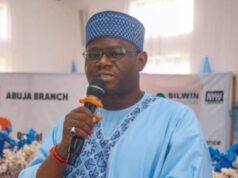
The Umuahia Diocese, Church of Nigeria, Anglican Communion has made it clear that its members would have nothing to do with the second term bid of President Muhammadu Buhari in the 2019 election.
The church, in a communiqué issued at the end of the ninth synod of the Umuahia Diocese held at St. Luke’s Church Amakama Olokoro in Umuahia South Local Government of Abia State, expressed dissatisfaction with the way the President has been handling herdsmen attacks on communities across the country.
The church asked the federal government explain to the world what happened to the traditional ruler of Isiama Afaraukwu, Eze Israel Kanu, his wife Ugoeze Sally, and their son, Nnamdi Kanu, the leader of the Indigenous People of Biafra (IPOB) after soldiers stormed the palace on September 14, 2017.
“The decision of the president to run for a second tenure should be reconsidered, and the synod called on him to resign honourably.”
The communiqué was drafted by a 10-member committee headed by Venerable Alex Ihemekwala and Rev. Nathaniel Ezemandu as secretary.
The synod condemned the “disturbing activities of the rampaging Fulani herdsmen and the inability of the government to rein the militants, adding that “this has led to pillage and destruction of villages and communities as well as dastardly massacre of innocent residents by the marauding Fulani herdsmen.”
It regretted that the federal government has continued to foot drag in taking decisive action against the rampaging herdsmen despite “national outcry against the Fulani herdsmen and calls for the federal government to declare them as terrorists.”
The synod however appreciated the efforts made by the government to negotiate the release of some of the Chibok and Dapchi school girls abducted by the Boko Haram terrorists but frowned on the intermittent resurgence of Boko Haram attacks and abduction of school girls and other residents, after the present administration had told Nigerians that the sect had been technically defeated.
On the general performance of elected political office holders, the synod noted that they have failed to adequately inform the electorate on the position and situation of things in the country at federal, state and local government.
At the local level, the synod commended the Abia State government for the free school meal programme being implemented at the primary schools thereby increasing nutritional intake and combating malnutrition and poor academic performance.
NonethelesS, the synod condemned the non-payment of backlog of salaries owed primary and secondary teachers in the state, and “advised that these backlogs of salaries be paid without further delay.






